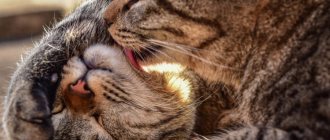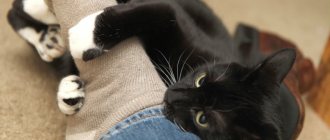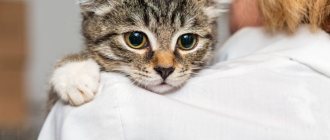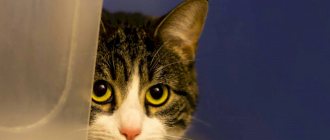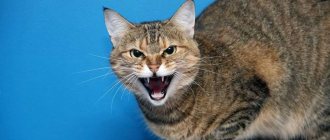They mark territory
Cats have many scent glands on their faces. They are found around the mouth, on the chin, on the cheeks, on the neck and on the ears. When a cat rubs its face against an object, it leaves behind a scent - this is called butting. The height of the object determines how much of the head will be used. These animals also tend to choose conspicuous objects, such as a protruding corner, a wall, the edge of a coffee table or sofa, or even the corner of a book or box. Males tend to mark more things. They also tend to cover up odors left by their fellow creatures.
LiveInternetLiveInternet
The mood is good now
Why does a cat love to rub against people and surrounding objects so much? In this way, the cat marks objects located in its territory. This allows her to recognize them later and feel confident in familiar surroundings. To apply marks, the cat uses special temporal glands located on both sides of the forehead between the ears and eyes. Similar organs are also present around the lips, more precisely, near their corners (perioral glands). They secrete secretions that a cat leaves on doors, stair railings and furniture legs when it rubs its head against them, such glands are also present on the tail: they also secrete a similar secretion that a cat applies by raising its tail with a pipe and moving it over a selected object . Glands can also be found around the anus and probably on the pads of the feet. Showing its favor towards a person, a cat leaves its marks on it, rubbing its muzzle and tail against it, often purring loudly. This behavior is one of the signs of affection that kittens show to their mother. At the same time, the person the cat rubs against is identified as part of its territory. Are cats cunning? Anyone who has lived under the same roof with a cat for a long time knows its habits. And a person who does not have a cat, coming to a house where there is one, often does not understand its behavior: what it intends to do, what it prefers, and what it does not like. For example, a cat is unlikely to allow a stranger to pet him, and if he is too persistent, he may even use his claws. But she will never do this without warning: before releasing her claws, she will hiss, pressing her ears to her head. An experienced cat lover will never be the first to approach an unfamiliar cat; he will let her walk around, look at him, and only then carefully extend his hand so that the animal can smell it. If the cat likes the person, it will come closer and arch its back, allowing itself to be stroked. A cat greets a familiar person in a special way. Raising her tail high, she hurries towards him, as soon as she sees him on the threshold, purrs loudly, rubs her muzzle and sides against her legs, and sometimes even stands on her hind legs to be stroked. And then he sits down in a corner somewhere and starts licking himself. This greeting ritual is necessary for the exchange of smells. On the temples and in the corners of the cat’s mouth there are glands that produce an odorous substance, which it distributes throughout the fur. When a cat rubs against its leg, it leaves its scent on it and at the same time perceives the scent of its owner. And when he then licks himself, he feels this smell more clearly. Our coarse noses can hardly catch anything like that. Familiar cats rub their fur and lick each other, also exchanging smells. For a cat that lives in a world of smells, smell plays a very important role. It often happens that a cat slightly bites the hand caressing it. This is a sign of friendship, and many people take it incorrectly. A person may even get angry with a cat because it is so unexpected and sometimes painful. But the cat does not at all want to offend - when she bites, she leaves her saliva on our “fur” (the cat is sure that we also have it) and thus once again marks “her”. It is believed that she also mistakes “her” person for a cat and expresses this through behavior similar to how a kitten treats its mother. Here's a typical example: a cat sits comfortably on its owner's lap and moves its left and right paws, as if lightly massaging or kneading something. Many people don't like it because it produces claws that pierce the dress or pant leg and scratch the skin. The answer is simple: the kitten used to make similar movements when it fed milk from its mother's nipple. Ethologists, specialists in animal behavior, called this action the “milk step.” Adult cats have very pleasant memories of their mother's milk. Therefore, the cat will become worried if you remove it from your lap at this moment, because the stroking hand caused the same sensation as the tongue of the mother cat, who once licked the kitten. Why do cats purr? A cat has many ways to show what it wants. A true connoisseur will always understand what his pet needs only by seeing how she sits, how she walks, and in what position her ears, mustache or tail are. If a cat is unhappy, she usually swings her tail in different directions; if she fluffs up her fur and arches her back, it means she wants to inspire respect for her person. And if you were gently touched by a cat’s paw, then it’s time to remember about your friend and think if he needs anything. When a cat rubs against your legs, it means that it is greeting you or reminding you that it needs to be fed. Even more diverse is the variety of sounds for which in our language there is only one word - “meow”. From a gentle purr to a piercing cry, a cat can express many different emotions using its voice. And she loves to talk. She meows for any reason: greeting or demanding something, calming you down or being tender, complaining or upset, happy or sad, begging or angry and even threatening. If you gradually begin to listen carefully to meowing, then over time you can learn to understand the character, mood and desires of your friend. Probably the most pleasant thing is to listen to a cat purr, to feel that she is happy. When the kitten is only a week old, he is already purring, telling his mother cat that everything is fine. Adult animals usually purr when they are simply in a good mood. Even if a cat goes hunting alone, it does not forget that it is a member of the cat society. And in rural areas, dozens of semi-wild animals often live together. Cats in such “families” lick each other’s fur, sleep together, curled up into a cozy ball, and take turns feeding the kittens. Professor Paul Leyhausen first described one of the most mysterious cat habits, the so-called “informal meeting among friends.” All animals living in the same area, which meet on the same paths during the day, often argue and even fight over hunting territory, and by the beginning of twilight they gather in some corner. There they sit quietly and peacefully at a distance of several meters from each other and only at midnight they disperse again. Nobody knows why cats do this. No wonder the cat is called the most mysterious animal. Source
The cat rubs against its legs: should we wean it or encourage it?
If the pet is healthy and has a nice coat, then confusion underfoot should be treated favorably, except for the following cases:
- Begging . When your pet has received his allotted portion of food and asks for more, you should not follow his lead. It is necessary to distribute food distribution so that the cat eats less during the day and more in the evening. To ensure a good, healthy sleep at night. If the cat receives ready-made food, but begs for pieces of meat or fish when cutting it, it is better not to give it. It has been observed that when fed premium or higher prepared foods, cats get sick less and live longer.
- The sterilized cat began to rub herself. An unspayed female may have bred nearby. In order not to provoke sexual behavior, you need to leave.
- The pet is trying to pity the owner and allow him into the child’s bedroom or room, where he is not allowed to enter. What to do? Ignore. The cat will understand that his attempts are not being followed and will stop bothering him.
The importance of smells in the cat community
In the animal world, far from human understanding, having a sensitive sense of smell plays an important role for survival. Much more effective than sight and hearing, the sense of smell helps to sense the approach of prey, a competitor or a sexual partner.
With the help of smells, cats transmit information to each other about the belonging of an individual to a pride, items of personal property, as well as the boundaries of the territory. A secret with an individual smell for each individual helps to mark these boundaries.
The glands that produce a special substance are located in three places:
- Animal muzzle.
- Areas between the pads on the paws.
- Under the tail - at the anus.
Thus, when the cat begins to rub against parts of the owner’s body, he somehow leaves his scent. The same applies to its relatives, as well as various inanimate objects, including the corners of sofas and walls. This behavior means that the pet is marking its property, protecting it from attacks.
I love you like a cat
The most pleasant part of cat signals consists of furry's declarations of love for his person. After all, it is also an instinctive desire to give affection and feel mutual care and love, since for a cat, its people are its pack.
And for this he has a whole arsenal of ways:
- Paw pawing – the cat rubs its paws over your body, slightly releasing its claws. At the same time, he can purr peacefully. This is a habit from childhood, like the kitten kneaded its mother’s belly.
- Gifts - a dead mouse or a bird in a slipper indicates a desire to please, to prove your love and devotion. This is how the cat shares its prey, a toy, and shows its human what a dexterous and brave hunter he is. Be sure to praise the animal for its feat.
- Looks into the eyes for a long time - this is a cat's kiss. If the cat also slowly squints its eyes, then it really likes you.
- Exposing his tummy is the highest degree of trust, because this is how the cat reveals the most unprotected part of his body to you. He is calm and comfortable with you. But don’t delude yourself: very often, when you reach out to your stomach, you come across a tricky “bite”. There is no need to be offended, such is the cat’s nature - now you have been caught for a game.
- Biting - a sudden attack, pawing and biting indicate a playful mood and the perception of you as a wonderful playmate. Sometimes a cat may not calculate the force of the bite, because cat skin is stronger than human skin, but there is no point in scolding for this - the cat will not understand why.
- Purring - if a cat next to you “starts its engine”, this is love. Sometimes a cat may purr to calm itself.
- Stalking - the cat follows you around when it wants attention and at the same time protects you from potential danger. And sometimes she reminds you that it’s time to have a snack.
To show cat feelings, the pet may begin to rub against the owner’s legs. I want to prolong this extremely pleasant behavior and not think at all about the reason for its occurrence. Why does he do this and is everything so clear for the cat himself?
• The person has health problems.
When a person has problems with some organ, his temperature begins to rise. The cat immediately finds this place and tries to lie down on it, because it is warmest there. Some even believe that a cat heals a person with its positive energy or completely takes away his illness.
In any case, you should pay attention to your health if your pet is trying to climb onto a certain part of the body.
But no matter how much the owners love their cats, they should not constantly carry them in their arms, press them to their faces or kiss them on the face, especially if the animal often walks outside the house.
After all, cats are carriers of skin, parasitic and infectious diseases that are transmitted to humans. Therefore, people need to carefully monitor the health of their cats, and if suspicious symptoms occur, immediately take the animals to the veterinarian.
Why do cats rub against objects and how are pheromones related to this?
Special scent glands can be found throughout a cat's body. They are located on the head, including the chin, lips, cheeks, tail and sides. These glands secrete chemicals we know as pheromones.
. When a cat cuddles and rubs against other cats or its owners, it releases pheromones. Humans cannot smell this smell, but other cats smell pheromones very well.
Read also: Why you shouldn’t drink a lot of green tea?
In order to enhance the smell of pheromones, a cat chooses relatively high objects and actively rubs its head against them, where the glands secreting this substance are located in large numbers. The smell of a pheromone can convey the reproductive status of its owner and other information about him, which is easily read by felines.
Cat body language: emotions expressed without words
Cats can't talk because they don't need to. They are quite capable of expressing all their emotions through body language and facial expressions. That is why communication with a cat comes down to understanding its gestures and actions, which can be a whole spectrum. Cat body language consists of communication using the head, ears, paws, tail, posture and, of course, the eyes. At the same time, communication with a cat should be based on understanding the complex of all gestures as a whole, besides, the animal always tries to express its emotions quite unambiguously.
Conventionally, the body language of cats can be divided into two groups - gestures that are directed directly at the owner (the cat licks his hand, hisses, rushes, rubs), or those that the cat makes as if in relation to itself, but so that the owner I could understand her easily.
The Inexplicable Behavior of Cats
The pet curled up into a ball and hid its face in its paws, you opened the closet and took out a warm sweater... after all, this is a sign, such behavior promises cold. You'd be surprised how many superstitions are associated with cats. For example, in ancient Rus', a cat was allowed into the baby’s cradle so that it could lie down and rub itself. Afterwards the child was put to bed, and he slept soundly.
A cat that rubbed itself against the guest’s legs suggested that the person came with good intentions and did not keep a stone in his bosom. Perhaps this is an exaggeration, but it’s not for nothing that they say that purrs see the energy of people, and they immediately smell cruel and vile bipeds... they scream, hiss and even attack them.
The ginger cat that rubs at your feet absorbs all the negative energy. Why exactly red is unknown. Most likely, this is due to another sign that sunny cats bring happiness, wealth and good luck to the owner. Again, the red cat brings peace to the family and eliminates conflicts, calming down the “separated” husband or wife.
The kitten squeaks. Why is the little kitten screaming?
Your kitten is nursing, but squeaks . There are several reasons why a small kitten screams.
— If a small kitten squeaks , then first you need to check the baby’s palate. Gently pick up the kitten in your hands and hold it firmly but gently. Insert the tip of your finger into his mouth (preferably from the side) and look inside to see if there is a cleft? If not, great. But if you notice a cleft palate in your baby, take him to the veterinary clinic; an experienced veterinarian will immediately tell you whether the kitten’s cleft palate is compatible with life. Unfortunately, most often these babies are euthanized.
— A newborn kitten needs to be weighed constantly. Immediately after birth and every day until 2 weeks of age. Then you can do it less often.
After checking the palate cock the kitten and check if it is gaining weight (at least 7 grams per day). It's good if everything is fine with your weight. But if the baby is not gaining weight, the cat may have little or no milk and the kitten is hungry. Start feeding your baby. This should be done after he has sucked the cat's breast. And control your weight.
You can watch the process of feeding a newborn Maine Coon kitten in this video.
— A kitten can scream if it’s cold . Place him on a heating pad while the cat is not around. Due to a decrease in body temperature, the kitten's sucking reflex may disappear and a hungry kitten will squeak.
— The kitten squeaks if the cat doesn’t lick him (doesn’t “pee, poop”). This happens if the cat is not experienced (firstborn) or something is bothering her (mastitis, endometritis, retained placenta). If the cat is inexperienced, you will have to care for the newborn yourself and at the same time try to teach the cat how to properly care for the baby. Using cotton wool and warm water, gently stroke the kitten to stimulate defecation and urination every 3 hours (before feeding). Some people find it helpful to spread sour cream or butter on the kittens' butts, then the cat begins to lick them with pleasure.
But if something is bothering the cat and she gets sick, then you will have to simultaneously care for the kittens and treat the mother. After recovery, the cat will take care of her kittens herself.
As you can see, there are many reasons why a kitten squeaks. A small kitten screams from hunger, from hypothermia, and from a bloated tummy, and sometimes you come across just very talkative babies who gain weight well, but love to scream.
In most cases, you can easily help the kitten, but sometimes the help of a qualified specialist is required.
Did you like the article and was it useful? Please share with your friends.
___________________________________
Other interesting articles on our website:
• Weak newborn kitten
• First vaccination for a kitten
• Where can I buy a kitten
• Vaccination against shingles
- < Back
- Forward >
Comments
Milena Rozhdestvenska 04/20/2015 19:37 Indeed, everyone remembers how little kittens squeak. No one wonders why they squeak.
Quote
Update list of comments
Add a comment
Write a comment, enter your email and receive two interesting books about cats as a gift! Attention! Comments are moderated, links and spam are not published.
The kitten expresses love and seeks reciprocal affection
The desire of adult cats to place their scent marks everywhere is quite understandable, but why then do small kittens, who are clearly not yet mature enough to make territorial claims, also rub against their owner’s legs? Felinologists have an opinion on this matter as well.
When an animal rubs its muzzle against someone, it not only transfers its scent to the object, but also performs an important social ritual. In this way, for example, a mother cat communicates with her offspring. For them, the touching of their faces is a way to make sure each other is feeling well, express trust, communicate their readiness to care, and instill a sense of security.
If a kitten gets in the owner’s face or rubs against his neck, this means that the baby subconsciously associates the person caring for him with his mother and expresses love for him in the way he is used to. You need to pet the baby in return. Establishing contact at this level is a very good sign, indicating that a strong trusting relationship will be formed between the animal and its owner in the future.
• Cat love.
No matter how harmful a character cats may have, they still love their owner, who takes care of them, feeds them and tries to create all the conditions for the cat’s comfort. Therefore, cats sometimes show tender feelings towards humans for no apparent reason.
They were just in a good mood, and they decided to show how glad they were that they had such a wonderful owner. Such a manifestation of love cannot be ignored or punished by a cat for increased attention to its person, because some pets can be seriously offended and take revenge.
Reasons for behavior
The cat ritual of wiping is somewhat similar to flirting. The pet presses its head against the owner's leg, then rubs its side, and as a finishing touch wraps its tail around the human limb. The animal performs the same manipulations with the hands of its owner, and sometimes pokes its muzzle in the face. This behavior has both an instinctive biological and social nature, which developed in the process of adaptation to home conditions.
To better understand cats, it is worth finding out why they continue to perform this ritual. Known reasons include:
- Marks. Just like personal belongings, toys, territory, for a cat a person is his personal property, a member of the family. When the owner is absent for a long time, his sign of belonging to the pride disappears. Purr senses this and begins to rub, correcting the misunderstanding.
- Collects information. This most often happens when guests come to the house. When coming into contact with someone new, the pet scouts the situation for a potential threat. In addition, by leaving its scent on guests, the animal adapts to their presence.
- Communicates with relatives. Domestic cats also have their own post office, and the postman is the owner of it. If a pet runs up to its human with a fit of tenderness, do not delude yourself. Perhaps the striped neighbor on the floor below conveyed very important news.
- Requires affection. In this case, a conditioned reflex is superimposed on the instinctive basis. It is produced by a kitten when it, marking a large and warm person with its scent, receives affection. As a result, the association is reinforced, and the animal begins to rub when it wants attention.
- He wants to eat. Here, rubbing is also associated with receiving pleasure after the ritual. However, it is not the only sign that the animal is asking to be fed. This is usually accompanied by meowing and a characteristic hungry look.
- Walking. During the period of sexual heat, females leave pheromones on their owners - messages for potential sexual partners. This is especially true for cats that do not go outside.
Interestingly, similar behavior can also occur among street animals. Often cats, on whose territory a person has set foot, thus declare their rights to him and show condescension.

